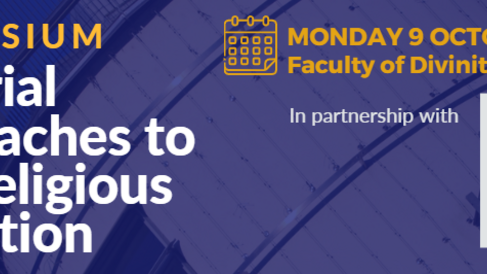
On Monday 9 October, two dozen people gathered at the Faculty of Divinity to spend an afternoon thinking about materiality and religious education. Organised and co-convened by Dr Anastasia Badder (Divinity) and Dr Daniel Moulin-Stozek (Education), the event brought together researchers and practitioners, and a healthy quotient of PGCE students—who inhabit the border territory between research and practice.
The convenors set the scene for discussion (with reference to the ‘New Materiality’), before introducing four panelists each of whom had been invited to talk about an object and its (potential) significance for inter-religious education. Panelists included Jewish-learning-entrepreneur Clive Lawton, R.E.-teacher-turned-PhD-weaver Sahra Ucar, and interdisciplinary researcher Naomi Van Rijn—alongside CIP-stalwart Dr Giles Waller.
After a short lunch break, practitioners from the Faith & Belief Forum delivered a hands-on workshop, helping participants to understand how insights might be put into practice in school classrooms. This latter session drew upon F&BF work in UK primary school settings, which has had a particular focus on parental engagement.
Cambridge PGCE student Callum Roberts reflects:
Objects as sacred signs
“We explored the importance of using objects as a mediating and ‘lived’ reality to a lived tradition. This allowed people to utilise their thoughts on how what (in the eyes of the secular) would be an ‘object’ is now/also identified as a living sacred sign of a tradition.
“The panel of specialists cultivated an atmosphere of great richness whereby individuals felt confident and interested in exploring a range of viewpoints towards and within a particular tradition. The use of objects allowed individuals to explain some of the misconceptions that may come with such material. Most importantly, the symposium enabled those interested within the area of interreligious dialogue to explore religion not as a response to ‘an institutional belt’, but rather a ‘lived reality’ which flows from a living and enriching dialogue within (but not consumed) by the world.
“In short, the significance of symbols and the commentary given ensured that individuals were equipped with knowledge that these sacred objects were a portal into the understanding of a contemporary tradition in an eternal viewpoint.
An outsiders workshop?
“Individuals were then given the opportunity to explore different world traditions within the workshop. This enabled people to speak openly and freely about such worldviews and the many misconceptions the individual may have. There was time for an exploration of contemporary ‘lived’ research and how this has both a direct and indirect effect on the individual, the group, and wider society both within and towards the religious tradition.
“The central activity challenged individuals’ own perceptions on what religious items may or may not be. Once explored, this gave the group the correct sense of direction and knowledge on that tradition.
“Overall, this session was a foundation to understanding how the ‘outsider’ of a particular tradition may view religion. Therefore, the contingent of trainee teachers and those specialising in the field of interreligious dialogue were encouraged to think like an ‘outsider’ so that the approach to teaching a tradition may be done in an open, inclusive, and freeing way to the individual, which they can dialogue with and amongst society.”
Blending research and practice
The cohort as a whole reported the activities provided a helpful balance between thought-based engagement and classroom-style application. Had there been more time for discussion, it would surely have been used.
We expect several of the participants to join us again for our next Scriptural Reasoning workshop—Dr Waller spoke compellingly about the role of an SR text pack as a material focus for inter-religious encounter.
This event was sponsored by the Cambridge Interfaith Research Forum small grant scheme, resulting from a joint application by Dr Badder and Dr Moulin-Stozek. The scheme is open to all Forum members, offering support with interdisciplinary and cross-sector events.
